<Back to Index>
- Governor of Cyprus and Field Marshal of the British Army "John" Allan Francis Harding, 1896
- Freedom Fighter Michalis Koutsoftas (Μιχάλης Κουτσόφτας), 1934
- Freedom Fighter Andreas Panagidis (Ανδρέας Παναγίδης), 1934
PAGE SPONSOR
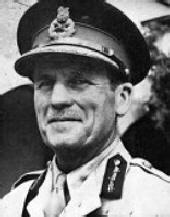
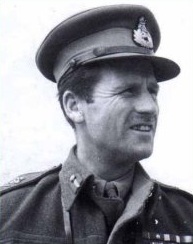
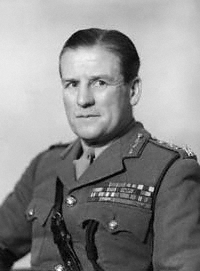
Field Marshal Allan Francis Harding, 1st Baron Harding of Petherton (10 February 1896 - 20 January 1989), known as John Harding, was a senior British Army officer who fought in both the First World War and the Second World War, served in the Malayan Emergency, and later advised the British government on the response to the Mau Mau Uprising. He also served as Chief of the Imperial General Staff (CIGS), the professional head of the British Army, and was Governor of Cyprus from 1955 to 1957 during the Cyprus Emergency. In both Kenya and Cyprus his rule was controversial and authoritarian, based on persecutions and executions.
Born the son of Francis Ebenezer Harding and Elizabeth Ellen Harding (née Anstice) and educated at Ilminster Grammar School and King's College London, Harding started as a boy clerk in December 1911, earning promotion to assistant clerk in the Post Office in July 1913 and then to full clerk in the Second Division of the Civil Service in April 1914.
He left his civilian career to join the 11th (County of London) Battalion (Finsbury Rifles) of the London Regiment, a unit of the Territorial Army, as a second lieutenant on 15 May 1914. During the First World War he was attached to the Machine Gun Corps and fought at Gallipoli in August 1915. He transferred to the regular armed forces as a lieutenant in the Prince Albert's (Somerset Light Infantry) on 22 March 1917 and was assigned to the Middle East theater of operations. He took part in the Third Battle of Gaza in November 1917 and was subsequently awarded the MC.
After the War he adopted the name "John" and in 1921 was posted to India. Promoted to captain on 11 October 1923, he joined the general staff at headquarters Southern Command in 1930 before becoming Brigade Major of 13th Infantry Brigade in 1933. He became a company commander with the 2nd Battalion of his Regiment with promotion to major on 1 July 1935. After a tour as a staff officer in the Directorate of Operations at the War Office, he was further promoted to lieutenant colonel on 1 January 1938.
Harding served in World War II initially as Commanding officer of 1st Battalion Somerset Light Infantry, in which capacity he served in Waziristan and was mentioned in dispatches, before joining the staff of Middle East Command in September 1940 and then becoming Brigadier on the General Staff of Western Desert Force in December 1940. He was awarded the CBE for services in that role. When General Richard O'Connor and General Sir Philip Neame were captured in April 1941, Harding took temporary command of Western Desert Force in which capacity he took the decision to hold Tobruk, was promoted to the substantive rank of colonel on 9 August 1941 and was awarded the DSO.
He went on to be Brigadier General Staff XIII Corps (the new name adopted by the former Western Desert Force) in August 1941 and, having been mentioned in dispatches in early 1942 and been awarded a bar to his DSO in February 1942, he became Deputy Director of Military Training Middle East Command that same month in which capacity he was again mentioned in dispatches in Summer 1942.
He was appointed General Officer Commanding 7th Armoured Division in September 1942 and during the Second Battle of El Alamein in October 1942 led his forward headquarters from a tank and then a jeep and was subsequently wounded by shell splinters. He was awarded a second bar to his DSO for this in January 1943.
He returned to the UK in November 1943 to take command of VIII Corps before being posted to Italy in January 1944 to become Chief of Staff to General Sir Harold Alexander commanding 15th Army Group. He was appointed KCB on 16 June 1944 for his service in Italy and promoted to the substantive rank of major general on 13 July 1944. He went on to take command of XIII Corps in Italy in March 1945 arriving in Trieste just after the German surrender. He was also awarded the Legion of Merit in the Degree of Commander by the President of the United States for his conduct during the War on 14 May 1948.
Promoted to lieutenant general on 19 August 1946, Harding succeeded General Alexander as commander of British forces in the Mediterranean in November 1946. He became General Officer Commanding - in - Chief Southern Command in July 1947 and went on to be Commander - in - Chief, Far East Land Forces on 28 July 1949 at the early stages of the Malayan Emergency. Having been promoted to full general on 9 December 1949, made ADC to the King on 21 October 1950 and advanced to GCB in the King's Birthday Honours 1951, Harding became Commander - in - Chief of the British Army of the Rhine on 30 August 1951.
He was appointed Chief of the Imperial General Staff on 1 November 1952: in this capacity he advised the British Government on the response to the Mau Mau Uprising. He was promoted to field marshal on 21 July 1953 and stood down from the post on 29 September 1955.
He was also Colonel of the North Somerset Yeomanry from 2 February 1949, Colonel of the 6th Queen Elizabeth's Own Gurkha Rifles from 18 May 1951, Colonel of the Somerset Light Infantry from 13 April 1953, Colonel of the Life Guards from 26 April 1957 and Colonel of the Somerset and Cornwall Light Infantry from 6 October 1959.
On
3 October 1955, Harding was assigned the post of Governor
of the British colony of Cyprus. As Governor of Cyprus,
Harding sought to restore the relations with the United
Kingdom, by negotiating with both the Greek - Cypriot and
the Turkish - Cypriot communities on the island, while the
British Government was negotiating with the Greek and
Turkish governments. Harding took strict measures to
improve the security situation in Cyprus, EOKA having
declared an armed struggle against the British on 1 April
1955. To this end, Harding instituted a number of
unprecedented measures including curfews, closures of
schools, the opening of concentration camps, the
indefinite detention of suspects without trial and the
imposition of the death penalty for offenses such as
carrying weapons, incendiary devices or any material that
could be used in a bomb. A number of such executions took
place often in controversial circumstances (e.g. Michalis
Karaolis) leading to resentment, in Cyprus, the United
Kingdom and in other countries.
Implementing the policy of the British Government, Harding also attempted to use negotiations to end the Cyprus crisis. However, negotiations with Archbishop Makarios III were unsuccessful and, eventually, Harding exiled Makarios to the British Colony of Seychelles. On 21 March 1956 EOKA made an assassination attempt on Harding's life which failed as the time bomb under his bed failed to go off. It was not long after this that Harding offered a reward of £10,000 for General George Grivas, the leader of EOKA.
Facing growing criticism in the United Kingdom about the methods he used and their lack of effectiveness, Sir John Harding resigned as Governor of Cyprus on 22 October 1957 and was replaced by Sir Hugh Foot.
In January 1958, Harding was created Baron Harding of Petherton. In retirement he became Non-Executive Chairman of Plessey as well being the first Chairman of the Horse Race Betting Levy Board. His interests included his membership of the Finsbury Rifles Old Comrades Association in which he participated until late in his life. He died at his home in Nether Compton in Dorset on 20 January 1989.
In 1927 he married Mary Rooke; they had one son:
John Charles Harding, 2nd Baron Harding of Petherton.
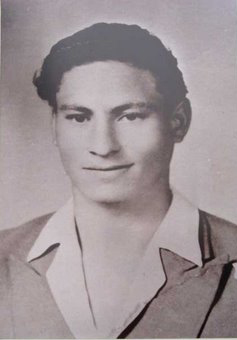
Michalis Koutsoftas was a Cypriot EOKA fighter during the 1955 - 1959 struggle against the British.
Koutsoftas was born on November 12, 1934 in the village of Palaiometocho, Lefkosia province, the son of Kyriakos and Eleni Koutsofta.
When the struggle broke out on April 1, 1955, Koutsoftas, offered his services and, despite his leftist political views, was initiated into EOKA by local priest Papa Lefteris.
Koutsoftas' usual task was the raising of the Greek flag in the centre of his village. After the execution of Michalis Karaolis and Andreas Dimitriou, on May 10, 1956, Koutsoftas decided it was time for more radical action. He quit his job and staked out Nicosia Airport where British soldiers were stationed.
On May 16, 1956, Koutsoftas accompanied Andreas Panagidis into the airport grounds and shot Royal Air Force Corporal Patrick John Hale dead. The two men was arrested and sentenced to die. A third companion, Paraskevas Choiropoulis, was sentenced to life imprisonment.
Koutsoftas and Panagidis were executed by hanging on September 21, 1956 along with another EOKA member, Stelios Mavrommatis arrested in a separate incident.
Koutsoftas was survived by his wife Eugenia. He was buried in the Imprisoned Tombs in the Central Jail of Nicosia.
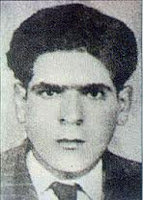
Andreas Panagidis was a Cypriot EOKA fighter during the 1955 - 1959 struggle against the British.
Panagidis was born on November 14, 1934 in the village of Palaiometocho, Lefkosia province, the son of Grigoris and Despina Panagi.
When the struggle broke out on April 1, 1955, Panagidis, who worked as a cook for the British army at Nicosia Airport, offered his services and was initiated into EOKA by his local priest.
His first act was to have been the raising of the Greek flag after the execution of Michalis Karaolis and Andreas Dimitriou, however, a British soldier found his flag after searching his belongings at the airport. The soldier then demanded that Panagidis wipe his shoes with the flag. Instead of submitting to such a humiliation, Panagidis attacked and beat the soldier.
The next day, May 16, 1956, Panagidis went to his work, accompanied by Michalis Koutsoftas and shot Royal Air Force Corporal Patrick John Hale dead. The two men were arrested and sentenced to die. A third companion, Paraskevas Choiropoulis, was sentenced to life imprisonment.
Panagidis and Koutsoftas were executed by hanging on September 21, 1956 along with another EOKA member, Stelios Mavrommatis arrested in a separate incident.
Panagidis was survived by his wife Yiannoula and their three children: Aristides, Despo and Avgi. He was buried in the Imprisoned Tombs in the Central Jail of Nicosia.